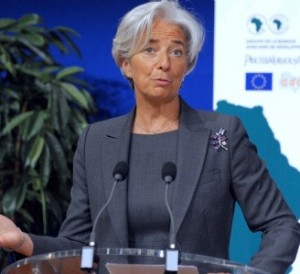Women inject less libido and less testosterone into the equation. It helps in the sense that we don’t necessarily project our own egos into cutting a deal, making our point across, convincing people, reducing them to a partner that has been lost in the process.
It’s probably overgeneralised what I’m saying and I’m sure there are women who operate exactly like men. But in the main … I honestly believe that the majority of women in such positions approach power … in a slightly different manner.
(London Telegraph, October 11, 2010)
 This is the somewhat controversial reasoning France’s finance minister, Christine Lagarde, offered to explain her compelling assertion that women make better politicians than men. Unfortunately, the dearth of women holding powerful political positions around the world makes her assertion impossible to prove.
This is the somewhat controversial reasoning France’s finance minister, Christine Lagarde, offered to explain her compelling assertion that women make better politicians than men. Unfortunately, the dearth of women holding powerful political positions around the world makes her assertion impossible to prove.
But we have enough data, as well as anecdotal evidence, from the way women have influenced the corporate world to make some credible extrapolations. The correlation between more women holding positions of power and the implementation of family friendly policies is undeniable in this respect.
Therefore, it’s entirely reasonable to assert that, if more women held positions of power in politics, they would use their power more towards building up human resources than military armaments – just to cite one obvious example.
 Finland’s president, prime minister, president of the Supreme Court, as well as eight of its eleven government ministers are all women. Arguably, there’s a direct correlation between their positions and Newsweek rating this county the best place to live in 2010 – in terms of health, economic dynamism, education, political environment, and quality of life.
Finland’s president, prime minister, president of the Supreme Court, as well as eight of its eleven government ministers are all women. Arguably, there’s a direct correlation between their positions and Newsweek rating this county the best place to live in 2010 – in terms of health, economic dynamism, education, political environment, and quality of life.
Alas, even though women routinely rate higher in many of the character traits we value in our leaders, including honesty, intelligence, compassion, and creativity, the vast majority of people still regard men as “better” leaders. I suspect, however, that this overweening paradox is due to nothing more than the lingering influence of paternalism.
Women in politics are a bit like a sports team that racks up the better statistics but still lose the game.
(Pew Research August 25, 2008)
That said, it would be remiss of me not to acknowledge that many studies have found that even a vast majority of women prefer male leaders. In fact, even in the corporate world where women have already proven themselves to be quite effective bosses, chauvinistic stereotypes about them being too bitchy and emotional still abound:
Last year in a survey of 2,000 British women in full or part-time employment, 63% said they’d prefer a male over a female boss. According to the research … most felt men were stronger decision makers and better at ‘steering the ship’…
‘A man any day of the week,’ says Stephanie Rovengo, ‘They do not have those female cat fight instincts.’
(Forbes Magazine, April 23, 2010)
And if so many women feel this way, just imagine how the majority of men feel. I suppose this means that my abiding dream of living in a world ruled predominantly by women instead of men may never come true….
Vera says
“many studies have found that even a vast majority of women prefer male leaders.”
Well didn’t those women have the same education as men? Didn’t they hear the same things as kids? We were all told that girls wear pink, boys wear blue. Girls play with pretty pink dolls, boys play with cars and monsters. Boys are violent and strong, girls are calm and weak. Boys play football, girls do ballet. When the kids want both, they are weird/gay… So how can a boy/girl/man/woman believe in a female leader when we grow up with the idea that women were born weak?